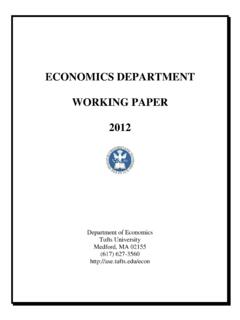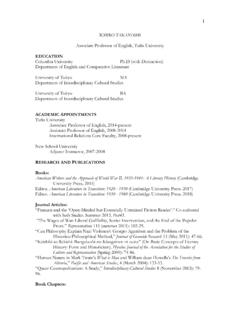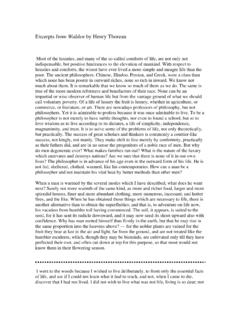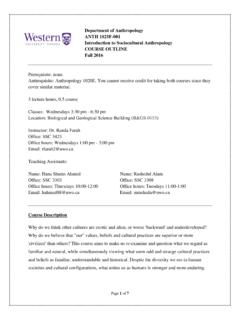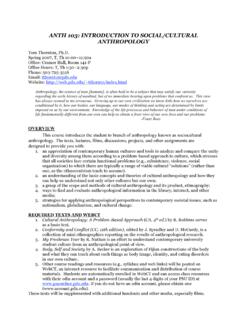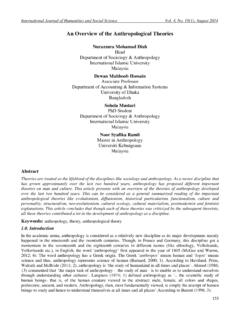Transcription of department of Anthropology - Tufts University
1 department ofAnthropologyspring 2018 course guideanthropology at tuftsanthropology at tuftsanthropology THE Anthropology MAJORTen courses, including:1. One Gateway (introductory) sociocultural Anthropology course (ANTH 05-39)2. One Gateway biological Anthropology or archaeology course (ANTH 40-59)3. ANTH 130 - Anthropological Thought4. One area-focused course numbered below 160 (gateway or mid-level)5. Two upper-level seminars (ANTH 160-189)6. Four additional courses in anthropologyWe strongly recommend taking the theory course ( Anthropology 130) in the junior year. The department encourages majors to explore the possibility of undertaking a senior thesis. A minimum of 50% of courses counted towards the Anthropology major must be completed at the Tufts University home campus or in Tufts University -sponsored programs abroad. A maximum of two courses cross-listed in other Tufts departments may be counted toward the Anthropology major.
2 Students must achieve a grade of C- or better for a course to count for credit toward the FOR STUDENTS WHO MATRICULATE AT Tufts REQUIREMENTS FOR STUDENTS WHO MATRICULATE AT Tufts AFTER SEPTEMBER 2018 Eleven courses, including:1. One Gateway (introductory) sociocultural Anthropology course (ANTH 05-39)2. One Gateway biological Anthropology or archaeology course (ANTH 40-59)3. ANTH 130 - Anthropological Thought4. ANTH 161 - Fieldwork Lab5. One critical geographies course (adopting a regional focus) numbered below 160 (gateway or mid-level)6. Two upper-level seminars (ANTH 162-189)7. Four additional courses in anthropologyWe recommend taking the theory course ( Anthropology 130) in the junior year and the ethnographic methods course ( Anthropology 161) prior to the senior year. The department encourages majors to explore the possibility of undertaking an internship ( Anthropology 99) or independent study ( Anthropology 191-199).
3 A minimum of 50% of courses counted toward the Anthropology major must be completed at the Tufts University home campus or in Tufts University sponsored programs abroad. A maximum of two courses cross-listed in other Tufts departments may be counted toward the Anthropology major. Students must achieve a grade of C- or better for a course to count for credit toward the photo: Mihrab, Meknes, Morocco, (CC BY-NC-ND ) Cocoabiscuit/FlickrBack cover photo: Hassan II Mosque, Casablanca, Morocco (CC BY-NC-ND ) Evgeni Zotov/Flickrspring 2018 coursesANTH 20 Global CitiesCathy Stanton K+ MW 4:30-5:45 PMANTH 32 introduction to the Anthropology of Science and Technology Nick Seaver I+ MW 3:00-4:15 PM CLST: STS 32 ANTH 44 Primate Social Behavior + LabTBD J+ TR 3:00-4:15 PM CLST: BIO 44 ANTH 128 Mesoamerican Archaeology Lauren Sullivan M+ MW 6:00-7:15 PMCLST: ARCH 128 ANTH 130 Anthropological Thought Sarah Pinto F+ TR 12:00-1:15 PMANTH 137 Language and Culture Tatiana Chudakova D+ TR 10:30-11:45 AM CLST.
4 LING 137 ANTH 149-13* Indigenous & Frontline Communities and Environmental Change Noor Johnson E+ MW 10:30-11:45 AMANTH 149-38 Biopolitics: Life, Knowledge, Power Tatiana Chudakova G+ MW 1:30-2:45 PM ANTH 149-40* Culture, Power, Islam: Global Religion in the Age of Nation-States Emilio Spadola H+ TR 1:30-2:45 PM CLST: REL 194-06 ANTH 159 Practicing in Food Systems Cathy Stanton 5 M 1:30-4:00 PM CLST: ENV 190 ANTH 185-20 How to Pay Attention Nick Seaver 1 T 9:00-11:30 AMANTH 185-23 Media Fallout: The Powers and Perils of Communication Emilio Spadola 0 M 9:00-11:30 AM CLST: FMS 194-02 ANTH 198 Apprenticeship ANTH 199 Senior Honors ThesisANTH 99 Internship ANTH 191 Directed ReadingANTH 197 Directed Research*starred courses count towards the Anthropology area course requirementCo-listed with Anthropology :AMER 10-01* Human Rights in the * Thomas Abowd E+ MW 10:30-11:45 AM CLST: ANTH 149-41*AMER 180-01 The Middle East in the American Imagination Thomas Abowd I+ MW 3:00-4:15 PM CLST: ANTH 149-46 AMER 180-02* Indigenous Ethnography* Jami Powell H+ TR 1:30-2:45 PM CLST: ANTH 149-45*AAST 94-01 Deconstructing the Coolie Rupa Pillai G+ MW 1:30-2:45 PM CLST: ANTH 149-47 CST 94-01* Gender and Sexuality in the Middle East*Thomas Abowd 11 T 6:30-9:00 PM CLST: ANTH 149-36*ENV 155 Environment, Communication and Culture Ninian Stein G+ MW 1:30-2:45 PM CLST.
5 ANTH 155 FAH 198-05 What is African Art? Peter Probst 8 R 1:30-4:00 PM CLST: ANTH 149-44 Amahl Bishara | Associate Professor *on leave* | Eaton Hall Room 305 Media, human rights, the state, knowledge production, politics of place and mobility, expressive practices, Middle EastAlex Blanchette | Assistant Professor *on leave* | Eaton Hall Room 309 Ecology, labor, green capitalism; posthumanist theory, biotechnology, animals; modernity, alienation, determination; food politics; industrial agriculture, Tatiana Chudakova | Assistant Professor | Eaton Hall Room 311 BMedical Anthropology , science and technology, environment, ethnicity and indigeneity, nationalism, post-socialism, Russia, North Machanda | Assistant Professor *on leave* | Eaton Hall Room 308 Biological Anthropology , primatology, chimpanzee behavioral ecology, primate life history and development, the evolution of social relationships, the ecology of male-female relationships Sarah Pinto | Professor | | Eaton Hall Room 307 Medical Anthropology , gender, reproduction, social and feminist theory, caste, political subjectivity, India, Seaver | Assistant Professor | Eaton Hall Room 311 AComputing and algorithms, sound and music, knowledge and attention, taste and classifi cation, media technologies.
6 Science and technology studiesRosalind Shaw | Associate Professor *on leave* Transnational justice, Anthropology of mass violence, local and transnational practices of redress and social repair, child and youth combatants, social memory, Atlantic slave trade, ritual and religion, West Africa, Sierra LeoneEmilio Spadola | Visiting Associate | Eaton Hall Room 304 Anthropology of religion, media and communication studies, security and governmentality, North Africa and the Muslim worldCathy Stanton | Senior | Eaton Hall Room 303 Tourism, museums, myth and ritual, cultural performance, culture-led redevelopment, mobilities, farm history/heritageLauren Sullivan | | Eaton Hall Room 303 Mesoamerican archaeology, Mayan archaeology, the rise and fall of complex societies, prehistory of the American Southwest, Paleoindians of North America, human evolution, cultural Anthropology , ceramic analysis, BelizeEmeritus FacultyStephen Bailey | Associate ProfessorDavid Guss | ProfessorDeborah Pacini Hernandez | Professorfaculty ANTH 20 Global CitiesCathy Stanton K+ MW 4:30-5:45 PMAs the world continues to become more urbanized, cities take on increasingly important roles as nodes in global fl ows of people, capital, and images.
7 Using theory and case studies from Anthropology and other disciplines, this course examines how shared identities are shaped, contested, memorialized, and erased in urban spaces, and how those spaces relate to their natural contexts. The course introduces students to some of the ways that social scientists have thought about issues of urban place-making, social cohesion and confl ict, and mobility. We will focus on the tensions between planned and lived urban space, on the co-construction of the global and the local in urban experience, and on ethnography as a set of methods for investigating the embodied and inherently political realities of life in cities. This course counts toward the Anthropology sociocultural gateway requirement and the Social Sciences distribution descriptionsANTH 32 introduction to the Anthropology of Science and Technology Nick Seaver I+ MW 3:00-4:15 PM CLST: STS 32 This course introduces students to the sociocultural study of science and technology.
8 Popular understandings of science and technology suggest that they work independently from their social and cultural contexts; this course surveys work demonstrating the various ways that this is untrue. Texts will be drawn from across the history of Anthropology and from science and technology studies. We will cover major theories about the relationship between science, technology, society and culture such as technological determinism and social construction. We will investigate how facts are made and how sociocultural contexts shape technologies, from Papuan eel traps to music recommender systems. Potential topics include the relationship between magic, technology, science, and religion; how Western science has and has not recognized other knowledges from around the world; cyborg feminism; the rituals of laboratory science; genetics and new kinship studies; and the social life of algorithms.
9 This course counts toward the Anthropology sociocultural gateway requirement and the Social Sciences distribution credit: (CC BY-NC ) ANTH 44 Primate Social Behavior + LabTBD J+ TR 3:00-4:15 PM CLST: BIO 44 Lecture + 1 required Lab component ( credits)Lab A ARR F 9:00-10:15 AMLab B F+ F 12:00-1:15 PMCome and meet your closest living relatives. This course is an an introduction to the social lives of primates. Drawing on experimental and observational studies, this course will teach students how to read and understand scientifi c literature and how to engage with the scientifi c method. We will cover the ecological, physiologi-cal, and developmental bases of primate social behavior, with special attention to the evolution of social interactions among individuals of different age, sex, relatedness, and status. Topics include competition and cooperation, dominance and territoriality, sex and mating, parenting, cognition and conservation.
10 This class will also include a weekly lab where students will learn primatological methods. No pre-requisites required. This course counts toward the Anthropology biological anth/archeology gateway requirement and the Natural Sciences distribution 128 Mesoamerican Archaeology Lauren Sullivan M+ MW 6:00-7:15 PM CLST: ARCH 128 This course is an introduction to the archaeology of the pre-Columbian cultures of Belize, Guatemala, Honduras, and Mexico. The cultures of Mesoamerica have been studied since the Spanish arrived and this course will examine the history of archaeological research in the region as well as the latest fi nds and interpretations. The Olmec, the Maya, the Zapotec, and the Aztec will be studied through artifacts, architecture, murals, inscribed monuments, hieroglyphs, and codices. We will begin the semester by examining the transition from hunting and gathering to early agriculture and the origins of village life across the region.



